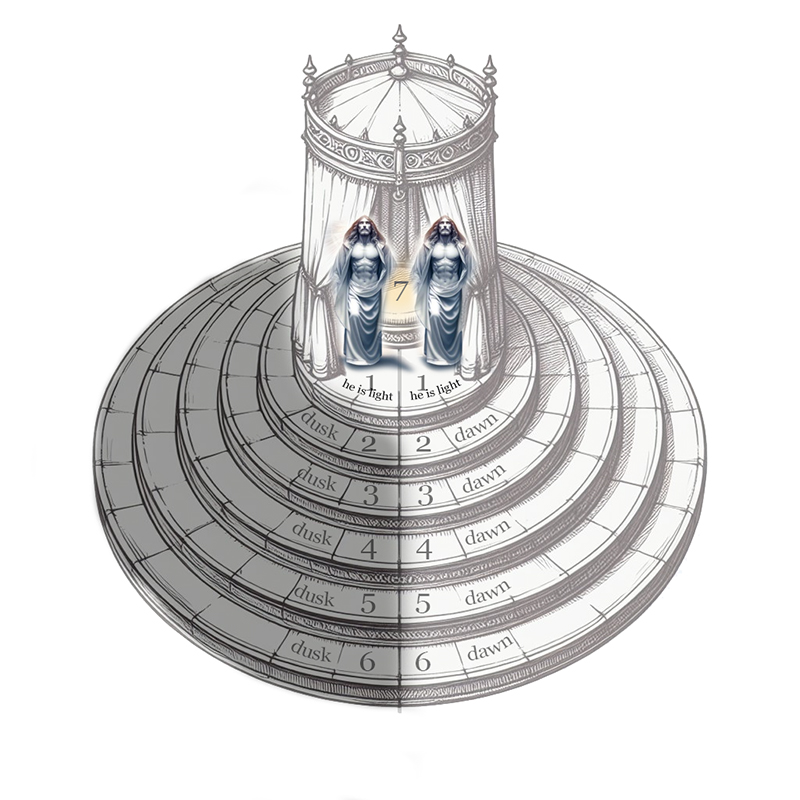Chapter 6
 Luke 6:1
Luke 6:1

Ἐγένετο δὲ ἐν σαββάτῳ δευτεροπρώτῳ διαπορεύεσθαι αὐτὸν διὰ τῶν σπορίμων· καὶ ἔτιλλον οἱ μαθηταὶ αὐτοῦ τοὺς στάχυας, καὶ ἤσθιον, ψώχοντες ταῖς χερσί.
RBT Greek Interlinear:
|
Strongs 1096
[list] Λογεῖον Perseus Egeneto Ἐγένετο became V-AIM-3S |
|
Strongs 1161
[list] Λογεῖον Perseus de δὲ and Conj |
|
Strongs 1722
[list] Λογεῖον Perseus en ἐν within Prep |
|
Strongs 4521
[list] Λογεῖον Perseus sabbatō σαββάτῳ Sabbath N-DNS |
|
Strongs 1279
[list] Λογεῖον Perseus diaporeuesthai διαπορεύεσθαι is passing along V-PNM/P |
|
Strongs 846
[list] Λογεῖον Perseus auton αὐτὸν himself PPro-AM3S |
|
Strongs 1223
[list] Λογεῖον Perseus dia διὰ across Prep |
|
Strongs 4702
[list] Λογεῖον Perseus sporimōn σπορίμων grainfields Adj-GNP |
|
Strongs 2532
[list] Λογεῖον Perseus kai καὶ and Conj |
|
Strongs 5089
[list] Λογεῖον Perseus etillon ἔτιλλον were plucking V-IIA-3P |
|
Strongs 3588
[list] Λογεῖον Perseus hoi οἱ the Art-NMP |
|
Strongs 3101
[list] Λογεῖον Perseus mathētai μαθηταὶ Learners N-NMP |
|
Strongs 846
[list] Λογεῖον Perseus autou αὐτοῦ himself PPro-GM3S |
|
Strongs 2532
[list] Λογεῖον Perseus kai καὶ and Conj |
|
Strongs 2068
[list] Λογεῖον Perseus ēsthion ἤσθιον they were eating V-IIA-3P |
|
Strongs 3588
[list] Λογεῖον Perseus tous τοὺς the Art-AMP |
|
Strongs 4719
[list] Λογεῖον Perseus stachyas στάχυας heads of grain N-AMP |
|
Strongs 5597
[list] Λογεῖον Perseus psōchontes ψώχοντες those who are rubbing V-PPA-NMP |
|
Strongs 3588
[list] Λογεῖον Perseus tais ταῖς the Art-DFP |
|
Strongs 5495
[list] Λογεῖον Perseus chersin χερσίν hands N-DFP |
RBT Hebrew Literal:
ψώχοντες - rubbing/grinding to bits
And he became within a second-first cessation,23 himself traveling through across sown fields, and Learners of himself were pulling out, and they were eating the Ears of Grain, those who are grinding down with the Hands.
δευτερόπρωτος is an adjective that was never figured out by scholars. It is two words compounded into one, second + first. As the author is coining a new word (hapax legomenon) it is certainly breaking the bounds of Greek thought. The unique word was commented on by Chrysostom and Epiphanius who lived in the 4th and 5th centuries.
A simple logic of the word is that cessation/sabbath is a joining (a.k.a Levi) of the first and second. Such a sense however would never fit into any calendric, sequential, or time-series logic, and thus such logic would never be possible to find.
Entering into the Sabbath Rest therefore can be seen as a dual act, from two sides, and thus a second-first cessation. When both sides cease, or find rest.
A simple logic of the word is that cessation/sabbath is a joining (a.k.a Levi) of the first and second. Such a sense however would never fit into any calendric, sequential, or time-series logic, and thus such logic would never be possible to find.
Entering into the Sabbath Rest therefore can be seen as a dual act, from two sides, and thus a second-first cessation. When both sides cease, or find rest.
Julia Smith Literal 1876 Translation:
And it was in the second first sabbath, he went through the standing corn; and his disciples pulled out the ears of corn, and ate, crumbling in small pieces with hands.
And it was in the second first sabbath, he went through the standing corn; and his disciples pulled out the ears of corn, and ate, crumbling in small pieces with hands.
LITV Translation:
And it happened on the second chief sabbath, He passed along through the sown fields. And His disciples plucked the heads and were eating, rubbing with the hands.
And it happened on the second chief sabbath, He passed along through the sown fields. And His disciples plucked the heads and were eating, rubbing with the hands.
ESV Translation:
Error retrieving verse.
Error retrieving verse.
Footnotes
| 23 | δευτερόπρωτος is a word unknown to scholars. It is two words compounded into one second + first. As the author, Luke, is coining a new word (hapax legomenon). The unique word was commented on by Chrysostom and Epiphanius who lived in the 4th and 5th centuries. A simple logic of the word is that cessation/sabbath is a joining of the first and second. Such a sense however would never fit into any calendric, sequential, or time-series logic, and thus such logic would never be possible to find. Entering into the Sabbath Rest therefore can be seen as a dual act, from two sides, and thus a second-first cessation. When both sides cease, or find rest.
|